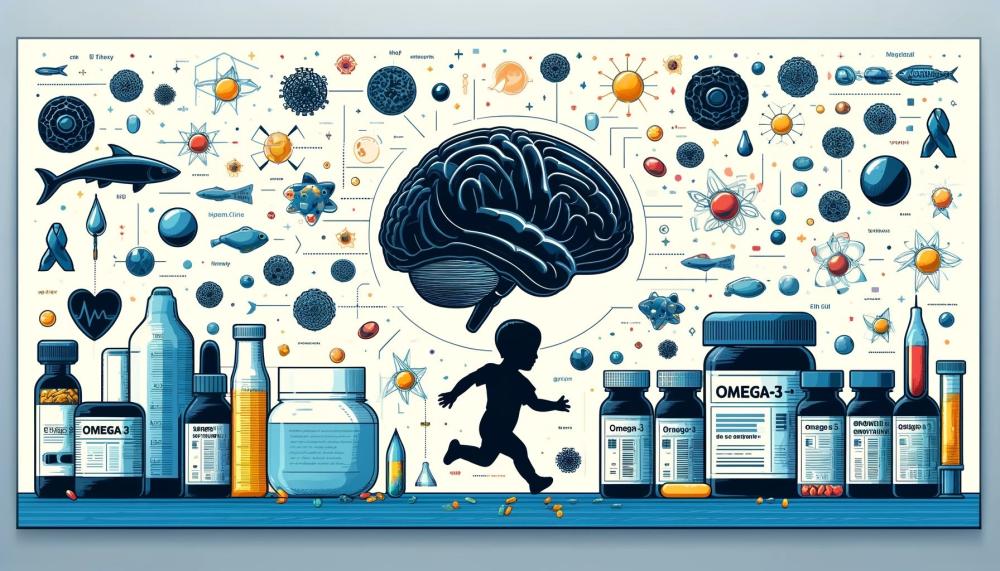
Omega-3 is one of the most important nutrients that plays a key role in children's growth and development, especially in the early years of life. These essential fatty acids are known as "brain fats" for their ability to support brain function, learning, and memory.
The importance of Omega 3 for children under 6 years old
Omega-3 acids offer many benefits for children under 6 years of age, including:
- Supporting brain and nervous system development: Omega-3 plays an important role in the formation and development of brain cells, enhancing brain functions such as learning, memory, and concentration.
- Improving eye health: Omega-3 is essential for maintaining eye health and function, especially vision.
- Promote heart health: Omega-3 helps lower blood pressure and reduce the risk of heart disease.
- Strengthening the immune system: Omega-3 improves immune system function, which helps fight infections and diseases.
- Allergy symptoms relief: Studies have shown that omega-3 may help relieve allergy symptoms such as asthma and eczema.
- Improving mental health: Omega-3 helps improve children's mental health and reduce the risk of depression and anxiety.
- Reducing the risk of chronic diseases: Some studies suggest that omega-3 may help reduce the risk of chronic diseases such as diabetes, heart disease, and obesity later in life.
Diving deeper into the benefits of Omega-3 for these children:
Supports brain and nervous system development:
- Omega-3 makes up 60% of the brain's structure, making it essential for developing brain functions such as learning, memory, and concentration.
- Omega-3 helps improve communication between brain cells, which enhances children's cognitive abilities.
- Omega-3 reduces the risk of learning disorders such as dyslexia.
Improve eye health:
- Omega-3 is essential for the formation of the retina, the part of the eye responsible for vision.
- Omega-3 helps protect the eyes from diseases such as macular degeneration and dry eye.
- Omega-3 improves night vision.
Promote heart health:
- Omega-3 helps lower blood pressure and reduce the risk of heart disease.
- Omega-3 reduces levels of bad cholesterol (LDL) and increases levels of good cholesterol (HDL).
- Omega-3 improves blood vessel function.
Strengthening the immune system:
- Omega-3 helps strengthen the immune system and fight infections and diseases.
- Omega-3 reduces the risk of respiratory infections.
- Omega 3 helps speed up the wound healing process.
Allergy symptom relief:
- Omega-3 helps reduce allergy symptoms such as asthma and eczema.
- Omega-3 reduces inflammation that causes allergy symptoms.
- Omega-3 improves the quality of life for children with allergies.
Improving mental health:
- Omega-3 helps improve children's mental health and reduce the risk of depression and anxiety.
- Omega-3 improves mood and behavior.
- Omi reduces
Reducing the risk of chronic diseases:
Some studies indicate that omega-3 may help reduce the risk of chronic diseases such as:
- Diabetes: Omega-3 helps improve the body's sensitivity to insulin, which contributes to regulating blood sugar levels.
- Heart disease: As mentioned earlier, omega-3 helps lower blood pressure and harmful cholesterol, reducing the risk of heart disease later in life.
- Obesity: Omega-3 is believed to help regulate appetite and control weight, reducing the risk of obesity.
Is Omega 3 beneficial for children with ADHD?
The topic of the benefits of omega-3 for children with attention deficit hyperactivity disorder (ADHD) has generated significant interest in recent years.
What is ADHD?
Attention deficit hyperactivity disorder (ADHD) is a common childhood disorder that causes symptoms such as:
- Hyperactivity: difficulty sitting still, talkativeness, impulsiveness.
- Inattention: difficulty concentrating, confusion, forgetfulness.
- Impulsiveness: making decisions without thinking, interrupting, and acting without considering the consequences.
What are the potential benefits of omega-3 for children with ADHD?
Some studies have shown that omega-3 may help improve ADHD symptoms in children, including:
- Relieving symptoms of hyperactivity: Some studies have shown that omega-3 may help reduce hyperactivity and impulsivity in children with ADHD.
- Improving attention: Some studies have shown that omega-3 may help improve focus and attention in children with ADHD.
- Improve /strong> Some studies have shown that omega-3 may help improve the overall behavior of children with ADHD.
- Reducing the need for medication: Some studies have shown that omega-3 may help reduce the need for stimulant medications used to treat ADHD.
How can omega-3 be given to children with ADHD?
Omega-3 can be given to children with ADHD by:
- Fatty fish: Fatty fish such as salmon, tuna, and sardines are a rich source of omega-3. Children aged 5 and over are recommended to eat at least two servings of fatty fish per week.
- Omega-3 supplements: Children can be given omega-3 supplements after consulting a doctor. Make sure to choose high-quality omega-3 supplements that are suitable for children.
Can I give Omega 3 to my 5 year old?
Yes, omega-3 can be given to children aged 5 and older. It's recommended to consume omega-3 through natural food sources such as fatty fish like salmon, tuna, and sardines.
At what age should I start taking Omega-3?
Omega-3 can be started from birth, and breastfeeding mothers are advised to take Omega-3 to ensure their infant receives these essential fatty acids.
How to give children Omega 3?
Children can be given Omega-3 through:
- Fatty fish: Fatty fish such as salmon, tuna, and sardines provide a rich source of omega-3. Children aged 5 and older are recommended to eat at least two servings of fatty fish per week.
- Omega-3 supplements: Children can be given omega-3 supplements. Make sure to choose high-quality omega-3 supplements that are suitable for children.
- Foods fortified with omega-3: Some foods such as eggs, milk, and orange juice are fortified with omega-3.
Omega-3 is an essential nutrient for children's growth and development, especially in the early years of life. Omega-3 can be obtained through natural food sources such as fatty fish and nutritional supplements suitable for children.

